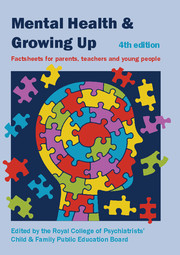Book contents
- Frontmatter
- Contents
- Contributors
- Factsheets for young people
- Factsheets for parents, carers and anyone who works with young people
- 1 Good parenting
- 2 The restless and excitable child
- 3 Dealing with tantrums
- 4 Children who soil or wet themselves
- 5 Sleep problems in childhood and adolescence
- 6 Behavioural problems and conduct disorder
- 7 Attention-deficit hyperactivity disorder (ADHD)
- 8 The child with general learning disability
- 9 Specific learning difficulties
- 10 Autism and Asperger syndrome
- 11 Depression in children
- 12 Worries and anxieties: helping children to cope
- 13 Divorce or separation of parents: the impact on children and adolescents
- 14 Death in the family: helping children to cope
- 15 The emotional cost of bullying
- 16 Traumatic stress in children
- 17 Domestic violence: its effects on children
- 18 Child abuse and neglect: the emotional effect
- 19 Drugs and alcohol: what parents need to know
- 20 Self-harm in young people
- 21 Psychosis
- 22 Schizophrenia
- 23 Bipolar disorder in children and adolescents
- 24 Obsessive–compulsive disorder in children and young people
- 25 Eating disorders in young people
- 26 Chronic physical illness: the effects on mental health
- 27 Medically unexplained physical symptoms
- 28 Chronic fatigue syndrome: helping your child get better
- 29 Parental mental illness: the problems for children
- 30 Who's who in CAMHS
24 - Obsessive–compulsive disorder in children and young people
from Factsheets for parents, carers and anyone who works with young people
Published online by Cambridge University Press: 02 January 2018
- Frontmatter
- Contents
- Contributors
- Factsheets for young people
- Factsheets for parents, carers and anyone who works with young people
- 1 Good parenting
- 2 The restless and excitable child
- 3 Dealing with tantrums
- 4 Children who soil or wet themselves
- 5 Sleep problems in childhood and adolescence
- 6 Behavioural problems and conduct disorder
- 7 Attention-deficit hyperactivity disorder (ADHD)
- 8 The child with general learning disability
- 9 Specific learning difficulties
- 10 Autism and Asperger syndrome
- 11 Depression in children
- 12 Worries and anxieties: helping children to cope
- 13 Divorce or separation of parents: the impact on children and adolescents
- 14 Death in the family: helping children to cope
- 15 The emotional cost of bullying
- 16 Traumatic stress in children
- 17 Domestic violence: its effects on children
- 18 Child abuse and neglect: the emotional effect
- 19 Drugs and alcohol: what parents need to know
- 20 Self-harm in young people
- 21 Psychosis
- 22 Schizophrenia
- 23 Bipolar disorder in children and adolescents
- 24 Obsessive–compulsive disorder in children and young people
- 25 Eating disorders in young people
- 26 Chronic physical illness: the effects on mental health
- 27 Medically unexplained physical symptoms
- 28 Chronic fatigue syndrome: helping your child get better
- 29 Parental mental illness: the problems for children
- 30 Who's who in CAMHS
Summary
What are the symptoms of OCD?
Some people have thoughts, ideas or pictures that come into their mind over and over again. They are difficult to get rid of and can feel silly or unpleasant. These are called obsessions. Some examples of obsessions include:
• ‘I must count to 20 or something bad will happen’
• worrying about germs and disease
• worrying about things being tidy.
Some people feel they have to do something repeatedly, even if they don't want to or it doesn't make sense. These are called compulsions. Some examples of compulsions include:
• repeatedly checking that the light is switched off
• washing hands again and again
• counting or repeating words in your head.
Often people try to stop themselves from doing these things, but feel frustrated or worried unless they can finish them. Problems with obsessions and compulsions can cause distress and worry, and can begin to affect young people at home with their families or at school with friends.
Many young people have mild obsessions and compulsions at some time, for example having to organise their toys in a special way, or saying good night a certain number of times. This is normal and may be the result of worry due to stress or change.
How do I know this is OCD?
If you are worried that a young person may have OCD, you need to first think about these questions:
• Do the compulsions upset the child?
• Do they interfere with the child's everyday life (e.g. school, friends)?
If the answer to these questions is ‘yes’, it may be that the young person has OCD. If this is the case, you should seek professional advice.
How common is it?
Obsessive–compulsive disorder can affect people of all ages irrespective of their gender, religion or class. It usually starts in childhood. It is thought that 1–2% of the population have OCD, which means that at least 130 000 young people have it.
What causes OCD?
We do not know the cause of OCD for certain. Research suggests it may be due to an imbalance in a brain chemical called serotonin.
- Type
- Chapter
- Information
- Mental Health and Growing UpFactsheets for Parents, Teachers and Young People, pp. 118 - 120Publisher: Royal College of PsychiatristsPrint publication year: 2013



